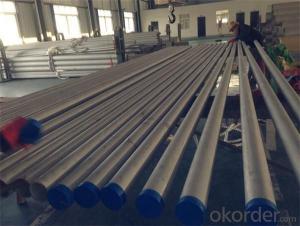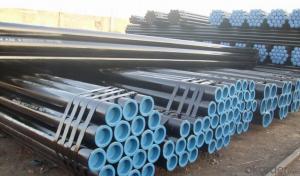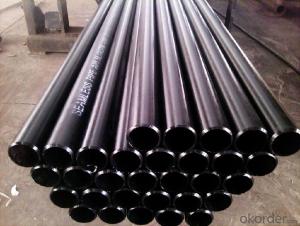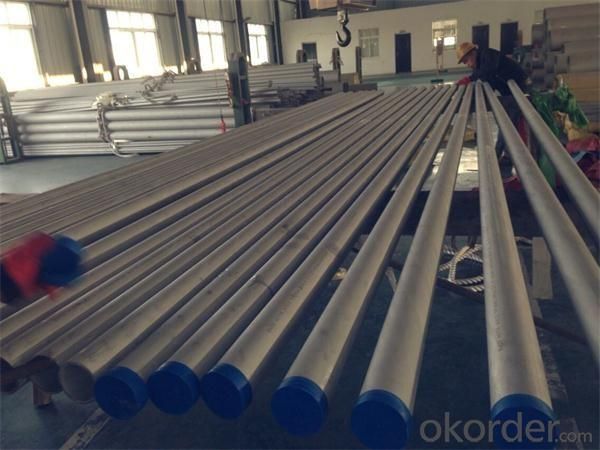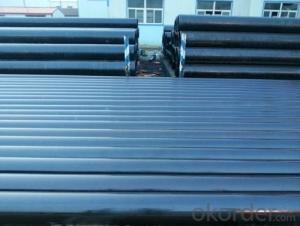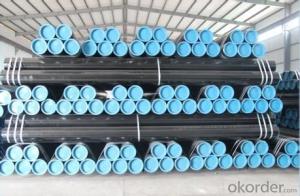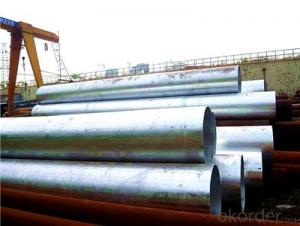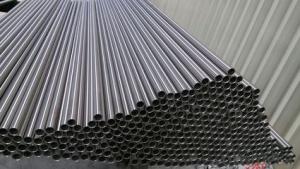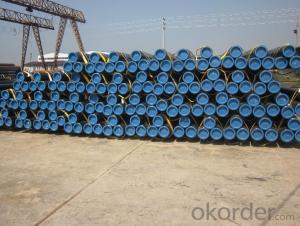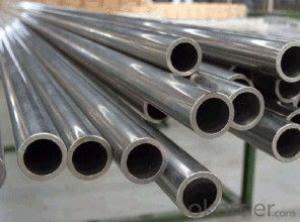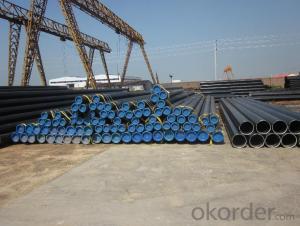CS Seamless Pipe with High Quality and Best Price
- Loading Port:
- Tianjin
- Payment Terms:
- TT OR LC
- Min Order Qty:
- 100 m.t.
- Supply Capability:
- 3000 m.t./month
OKorder Service Pledge
OKorder Financial Service
You Might Also Like
Product Description:
1、Structure of CS Seamless Pipe Description:
CS Seamless pipe is formed by drawing a solid billet over a piercing rod to create the hollow shell. As the manufacturing process does not include any welding, seamless pipes are perceived to be stronger and more reliable. Historically seamless pipe was regarded as withstanding pressure better than other types, and was often more easily available than welded pipe.
2、Main Features of the CS Seamless Pipe:
• High manufacturing accuracy
• High strength
• Small inertia resistance
• Strong heat dissipation ability
• Good visual effect
• Reasonable price
3、CS Seamless Pipe Images:
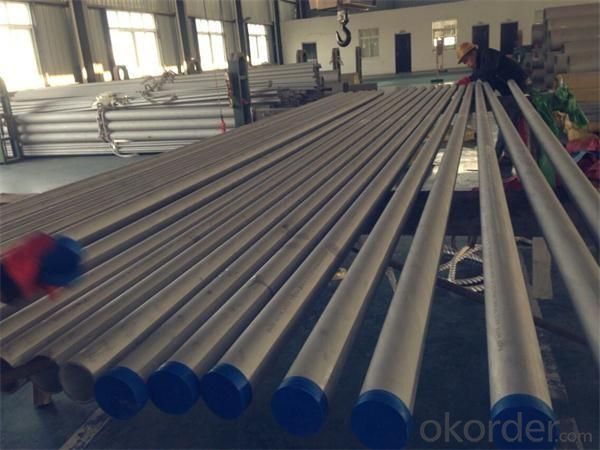
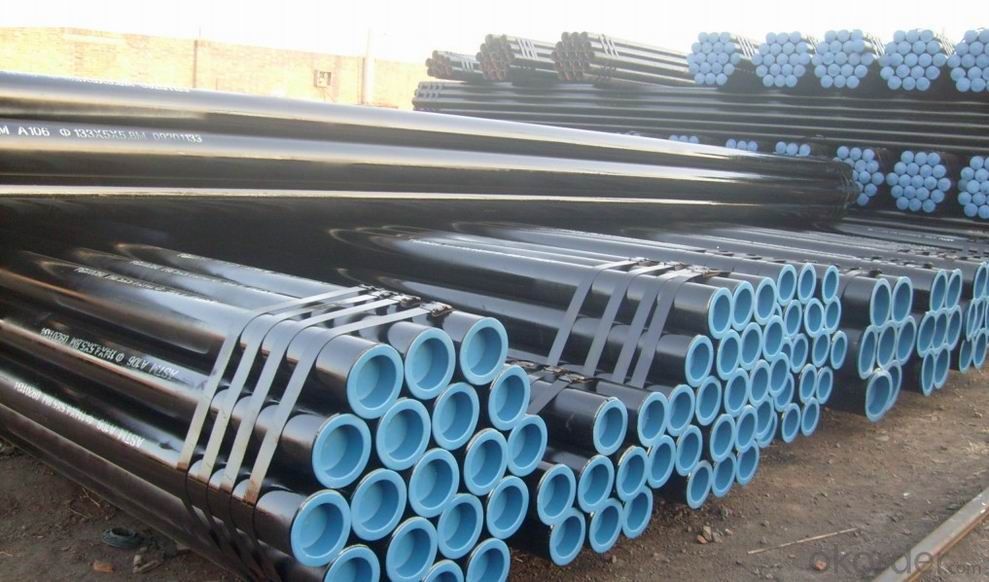
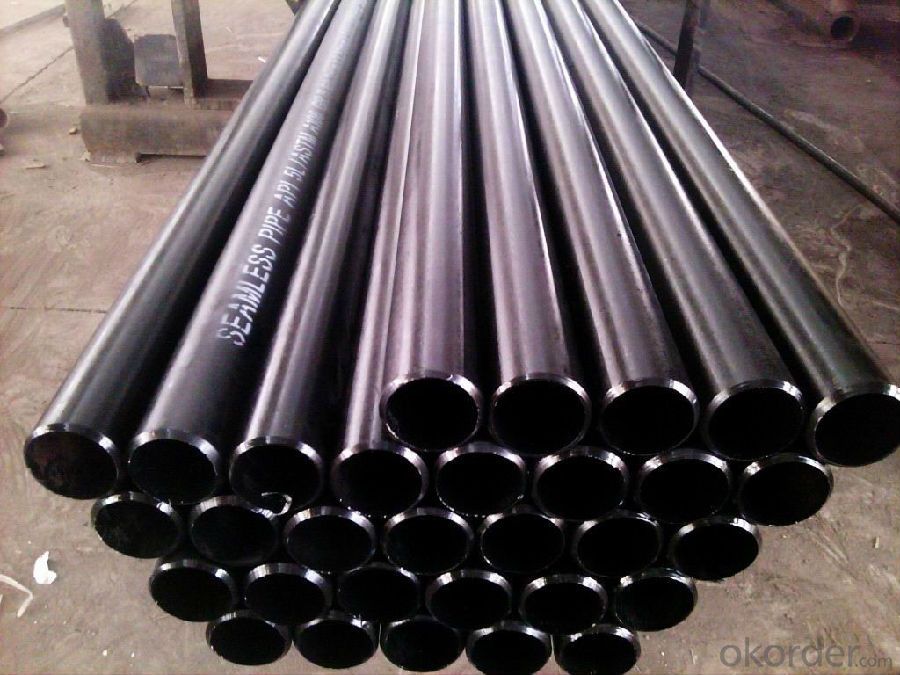
Packaging & Delivery
| Packaging Details: | seaworthy package, bundles wrapped with strong steel strip |
| Delivery Details: | 15-30 days after received 30% TT |
4、CS Seamless Pipe Specification:
| Standard: | GB, DIN, AST ASTM A106-2006, ASTM A53-2007M |
| Grade: | 10#-45#, 16Mn 10#, 20#, 45#, 16Mn |
| Thickness: | 2 - 50 mm |
| Section Shape: | Round |
| Outer Diameter: | 21.3 - 620 mm |
| Secondary Or Not: | Non-secondary |
| Application: | Hydraulic Pipe |
| Technique: | Hot Rolled |
| Certification: | API |
| Surface Treatment: | factory state or painted black |
| Special Pipe: | Thick Wall Pipe |
| Alloy Or Not: | Non-alloy |
| Length: | 5-12M |
1.Name:seamless steel pipe
2.Material:20#(ASTM A 106/A53 GRB.API5LGRB,GB),45#,16Mn,10#.
3.Specification range:OD:21.3-610mm,WT:6-70mm,length:6-12m or according to the requirement of clients.
4.Excutive standards:GB,ASME API5L.ASTM A 106/A53,Despite of the above standards,we can also supply seamless steel pipe with standard of DIN,JIS,and so on,and also develop new products according to the requirements of our clients!
5.Surface:black lacquered,varnish coating or galvanized.
6.Ends:Beveled or square cut,plastic capped,painted.
7.Application:seamless steel pipe for low and medium pressure boiler,high pressure boiler and ship-building,liquid service,petroleum cracking,chemical fertilizer equipment,drawing-oil-equipment and structure purpose!
8.Packing:bundles wrapped with strong steel strip,seaworthy packing.
5、FAQ of CS Seamless Pipe:
①How is the quality of your products?
Our products are manufactured strictly according to national and internaional standard, and we take a test
on every pipe before delivered out. If you want see our quality certifications and all kinds of testing report, please just ask us for it.
Guaranteed: If products’ quality don’t accord to discription as we give or the promise before you place order, we promise 100% refund.
②How about price?
Yes, we are factory and be able to give you lowest price below market one, and we have a policy that “ for saving time and absolutely honest business attitude, we quote as lowest as possible for any customer, and discount can be given according to quantity”,if you like bargain and factory price is not low enough as you think, just don’t waste your time.Please trust the quotation we would give you, it is professional one.
③Why should you chose us?
Chose happens because of quality, then price, We can give you both.Additionally, we can also offer professional products inquiry, products knowledge train(for agents), smooth goods delivery, exellent customer solution proposals.Our service formula: good quality+good price+good service=customer’s trust
SGS test is available, customer inspection before shipping is welcome, third party inspection is no problem.
Any question, pls feel free to contact us !
- Q: How are steel pipes used in the construction of wastewater treatment plants?
- Steel pipes are commonly used in the construction of wastewater treatment plants due to their durability, strength, and corrosion resistance. These pipes are used to transport wastewater from different points within the treatment plant, such as pipes for raw sewage, sludge, and treated water. Additionally, steel pipes are also used for structural purposes, such as supporting tanks and other equipment. Overall, steel pipes play a crucial role in the efficient and reliable operation of wastewater treatment plants.
- Q: What is the average lifespan of a steel pipe?
- The average lifespan of a steel pipe can vary depending on various factors such as the quality of the steel, the environment it is exposed to, and the maintenance practices followed. However, on average, a well-maintained steel pipe can last anywhere between 20 to 100 years.
- Q: How do you determine the weight per foot of a steel pipe?
- To determine the weight per foot of a steel pipe, you need to consider two main factors: the thickness and the diameter of the pipe. First, you need to measure the outer diameter (OD) and the wall thickness (WT) of the pipe using a caliper or a measuring tape. Once you have these measurements, you can calculate the inner diameter (ID) by subtracting twice the wall thickness from the outer diameter (ID = OD - 2 * WT). Next, use the formula for the cross-sectional area of a pipe (A = π * (OD^2 - ID^2) / 4) to calculate the cross-sectional area. Finally, multiply the cross-sectional area by the density of the steel, which is typically around 490 pounds per cubic foot, to determine the weight per foot of the steel pipe. Weight per foot (WPF) = A * 490 It's important to note that this calculation provides an estimate of the weight per foot, as manufacturing tolerances and slight variations in the density of the steel may affect the actual weight. Therefore, it is recommended to use this calculation as a guide and consult the manufacturer's specifications for more precise information.
- Q: How do you calculate the bending moment of a steel pipe?
- To calculate the bending moment of a steel pipe, you need to consider both the applied load and the structural properties of the pipe. The bending moment is a measure of the internal forces within the pipe caused by the applied load. The bending moment can be calculated using the following equation: Bending Moment = Load x Distance Here, the load represents the external force acting on the pipe, and the distance is the distance from the point where the load is applied to the point where the bending moment is being calculated. In order to accurately calculate the bending moment, you must also consider the properties of the steel pipe. This includes the pipe's cross-sectional area, second moment of area (also known as the moment of inertia), and the modulus of elasticity. The second moment of area reflects the pipe's resistance to bending and can be calculated based on the dimensions of the pipe's cross-section. The modulus of elasticity represents the pipe's stiffness and can be obtained from material properties data. Once you have determined the load, distance, cross-sectional area, moment of inertia, and modulus of elasticity, you can plug these values into the bending moment equation to calculate the bending moment for the steel pipe. It is important to note that the calculation of bending moment assumes linear elastic behavior, which means that the pipe does not exceed its elastic limit and does not undergo plastic deformation. If the pipe is subjected to loads that exceed its capacity, the calculation of bending moment may not accurately represent the actual behavior of the pipe. In such cases, it is advisable to consult with a structural engineer or use more sophisticated analysis methods to accurately assess the bending moment.
- Q: How are steel pipes used in natural gas processing plants?
- Steel pipes are used in natural gas processing plants to transport and distribute natural gas from one point to another within the facility. These pipes are capable of withstanding high pressure and temperature, ensuring the safe and efficient flow of the gas throughout the plant. Additionally, steel pipes are resistant to corrosion, which is crucial as natural gas can be corrosive. They are also used for connecting various equipment and components in the processing plant, allowing for the smooth operation of the entire system.
- Q: What are the common uses of steel pipes in construction?
- Due to their durability and strength, steel pipes are widely used in construction for various purposes. Plumbing systems in buildings commonly rely on steel pipes, which can effectively transport water, gas, and other fluids. Their resistance to corrosion and ability to withstand high pressure make them the preferred choice over alternative materials. Steel pipes are also frequently employed for structural support in construction. They serve as columns or beams, providing buildings with structural integrity and stability. With their capacity to support heavy loads, steel pipes are highly favored in the construction industry. Bridges and highways often incorporate steel pipes into their design. They are utilized to create sturdy and long-lasting bridge supports, guardrails, and signposts. The ability of steel pipes to endure extreme weather conditions and heavy traffic makes them a reliable option for infrastructure projects. Additionally, steel pipes are indispensable for underground utilities like sewer and drainage systems. They offer a robust solution for transporting wastewater and preventing leaks. Moreover, they play a crucial role in constructing underground tunnels and pipelines. Furthermore, steel pipes find application in fencing, scaffolding, and handrails in construction. Their strength, versatility, and ability to withstand harsh environmental conditions make them a preferred choice. In summary, steel pipes are vital components in construction due to their numerous advantages. Their durability, strength, and resistance to corrosion make them a reliable choice for various applications in the construction industry.
- Q: Can steel pipes be used in marine environments?
- Indeed, the usage of steel pipes is viable in marine environments. Steel, being a robust and sturdy material, possesses the capability to endure the severe conditions prevalent in marine surroundings, encompassing saltwater exposure, wave impacts, and corrosion. Nevertheless, it is imperative to meticulously choose the appropriate steel variant and implement suitable protective measures to avert corrosion. Stainless steel and corrosion-resistant alloys are often employed in marine applications due to their exceptional resistance against corrosion and ability to withstand continuous saltwater exposure. Furthermore, the application of coatings such as epoxy or zinc can be an effective means of fortifying steel pipes against corrosion. Consistent maintenance and inspections are also pivotal in ensuring the durability and functionality of steel pipes in marine settings.
- Q: How long do steel pipes last?
- The lifespan of steel pipes can vary depending on several factors, including the quality of the steel used, the environment in which they are installed, and the maintenance and care given to them. Generally, steel pipes are known for their durability and longevity. With proper installation and regular maintenance, steel pipes can last for several decades, often exceeding 50 years. However, it is important to note that external factors such as corrosion, exposure to extreme temperatures, and chemical reactions can significantly affect their lifespan. Regular inspections, timely repairs, and protective coatings can help extend the life of steel pipes, ensuring their reliability and functionality for many years.
- Q: Can steel pipes be used for chemical storage tanks?
- The utilization of steel pipes for chemical storage tanks is contingent upon the specific application and the composition of the chemicals in question. Steel, being a robust and enduring material, is generally well-suited for a multitude of industrial purposes. Nevertheless, certain chemicals have the potential to corrode steel, thereby compromising the tank's integrity. In such instances, it is imperative to employ corrosion-resistant coatings or linings on the steel pipes to safeguard against chemical reactions. Furthermore, adherence to industry standards and regulations during the tank's design and construction is crucial to guarantee the safe storage of chemicals. Consequently, while steel pipes can indeed be deployed for chemical storage tanks, meticulous consideration must be given to the nature of the chemicals being stored, and appropriate measures must be taken to prevent corrosion and ensure safety.
- Q: How are steel pipes used in HVAC systems?
- Steel pipes are used in HVAC systems for various purposes such as transporting hot or cold water, steam, or refrigerant throughout the system. They are commonly used for supply and return lines, as well as for connecting various HVAC components like chillers, boilers, air handlers, and heat exchangers. Steel pipes are preferred in HVAC systems due to their durability, strength, and resistance to corrosion and high pressure.
Send your message to us
CS Seamless Pipe with High Quality and Best Price
- Loading Port:
- Tianjin
- Payment Terms:
- TT OR LC
- Min Order Qty:
- 100 m.t.
- Supply Capability:
- 3000 m.t./month
OKorder Service Pledge
OKorder Financial Service
Similar products
Hot products
Hot Searches
Related keywords
